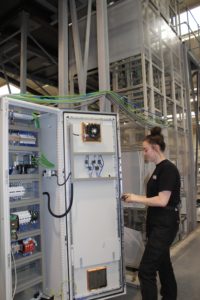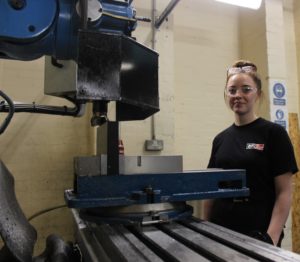For thousands of young hopefuls, exam results represent the opportunity to progress into higher education and, eventually, full-time work. But with university fees costing thousands of pounds each year and many graduates struggling to find suitable work after years of study, another route, apprenticeships, is once again becoming an attractive option for prospective youngsters.
According to government statistics, apprenticeship starts were up by more than seven per cent for the first thee quarters of the 2018/19 academic year, with 20,700 more enrolling compared to the previous year.
One company that has reaped the benefits of apprenticeships is adi Group. Based in Kings Norton, Birmingham, the multi-million pound engineering business has already smashed its 2020 target to have five per cent of its workforce made up of apprentices and was the first in the country to launch a pioneering pre-apprenticeship scheme – bringing budding youngsters on board as early as 14 to get to grips with the engineering world.
Here, we talk to two adi successes – one, a former apprentice and now adi Automotive managing director, Ritchie Webb, and the second, current apprentice Caitlyn Kett-Davies, to gather their perspectives on apprenticeships and the benefits they bring.
Tell us about your beginnings and why you chose to be an apprentice?
RW: I completed a four-year electrical and instrumentation engineering apprenticeship at a Courtaulds Engineering Limited in Coventry.
I wanted to earn some money and the apprenticeship route just fitted what I wanted to do. My uncle is an electrical engineer and had always seemed to enjoy his work, so it looked like an interesting career to pursue. I was offered three apprenticeships, including one at Rolls-Royce. However, I turned it down because my dad worked there and I was keen to do something different and off my own back, so I decided to accept the offer from Courtaulds instead!
CKD: I started the adi apprenticeship in March after completing a level three BTEC in engineering. I’d looked at universities and attended open days but none of them were really offering the hands-on experience I wanted. I knew, in the long run, I’d be much better off having actually completed practical engineering work than stuck in a classroom. The academic side is important but it can’t compensate for on-the-job experience.
 During your apprenticeship, what kinds of projects did you support and what type of work did you undertake on a daily basis?
During your apprenticeship, what kinds of projects did you support and what type of work did you undertake on a daily basis?
RW: I was involved in all sorts of different projects. Courtaulds dealt mostly with process plants, so a lot of the work I did was based on petrochemicals, pharmaceuticals, powder and material handling.
Each apprentice spent the first two months in reprographics, which gave you an insight into all of the different departments within Courtaulds, where they were, who worked in them and what they did.
I then moved about a bit. I spent one year in an engineering training centre based off-site and then another three months at GEC, in Stoke-On-Trent, building and testing LV Panels. I was also selected by the Coventry Chamber of Commerce to take part in an apprentice exchange programme, working in Kiel, in North Germany, for three months at a typewriter factory. I’d only studied Spanish at school, so I had to enrol on a two-week intensive German course to get up to speed quickly!
As you can tell, I didn’t really have a set daily routine as my apprenticeship programme meant that I moved around the company every three months. In the final year or so I finally settled into the electrical design department. There I was sizing cables and containment systems, working piping and instrumentation diagrams and creating detailed design drawings.
CKD: Day to day is split, so for four weeks I’ll be using design software, like Solidworks, to create little projects and then, in the workshop, I’ll get hands-on experience learning how to use different machines. So far I’ve got to grips with the CNC machine, the lathe, the milling machine and ingraving, so you do get a lot of practical knowledge.
For me, I keep a little note of what I’m doing, which a lot of people forget, but it’s all good to remember come interview time. You realise that you’ve done a lot that you could use straight away in full-time work
How has an apprenticeship benefitted you so far?
RW: My apprenticeship definitely gave me a good grounding and in-depth understanding of processes, construction and manufacturing plants, which has been invaluable as I have progressed in my career.
I actually think it gives you a head start. By the time most of the people I knew came out of university, I was already a practical member of a workforce, rather than being a graduate with little or no experience of how a business works.
CKD: Any qualification helps, whatever job you’re applying for; it’s good to having something extra that someone else doesn’t.
I went online and applied for lots of apprenticeships but adi seemed extra beneficial, given the companies that they work for. I knew I’d get good experience that I could shout about later on.
What advice would you give to youngsters looking into engineering apprenticeships?
RW: My advice would be to have the right attitude and not to think that any task is beneath you. You are there to learn and some tasks that may be considered as more menial really help you understand what everyone else does and the processes that are involved. It’s only by doing those things that you understand what has to be done to get the job done. Take responsibility, and you’ll go a long way.
I’d also say, nowadays, don’t just assume that university is the be all and end all. An apprenticeship doesn’t just have to be a vocational job that you end up set in. It can be a stepping-stone to something further. You’ll have a tonne of practical contacts that may prove useful further down the line, as well as the experience under your belt.
CKD: I think its worth researching and making 100% sure it’s definitely what you want to do. The research is the main, important thing.
I think ,with the increase in the cost of university and that massive word – debt – it’s quite good to be earning and learning at the same time. But it’s not just about the earning, I’m really happy to be getting practical experience in a nice, working environment.
You also need to think long-term. The more you continue, the more likely you are to succeed. That’s why adi has the pre-apprenticeship scheme starting from age 14. The more work you put in early on, the greater the reward will be later.
I’m definitely happy with the decision I made. I have learnt a lot and I don’t think, at any point, that I’ve had any doubts. I think it really could be the way to go for a lot more students in future.

What does the future hold for the both of you?
RW: We just reached £100m in orders for adi Automotive, which is the fastest-growing division in the group’s 30-year history. It’s thanks, in part, to not only our hard work but also the huge brands we work with up and down the country, like BMW / MINI in Oxford.
We’re also doing lots of innovative things around electric vehicle charging and infrastructure, with one eye on full-vehicle electrification. It’s only going to get bigger in the future, so, for now, I’d just say watch this space!
CKD: More than likely I’ll look at adi for a job after the apprenticeship.
With the workshop, I’ve been on site with customers, so I’ve already had a glimpse at what I could be working on. I’ll keep the RAF dream in my back pocket but right now I’m just focused on finishing the apprenticeship and getting the experience I need to set me apart from the competition.
Adi Automotive is calling on businesses across the region to replicate its success, and has produced a free guide at:
https://www.adiltd.co.uk/wp-content/uploads/2017/06/adi-Pre-Apprenticeship-Pack.pdf





